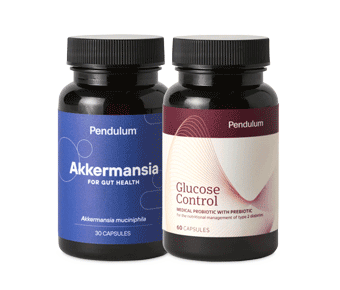WellnessVerge is reader-supported. We may earn a commission when you make a purchase through the links on this page. Learn more about our process here.
Pendulum Probiotics Review: Is It Worth It? A Dietitian Explains
Published on January 19, 2022
Medically Reviewed by Ana Reisdorf, MS, RD
Pendulum Probiotics are intended to help people with type 2 diabetes improve their blood sugar control. While the product’s health claims are backed by scientific research, they come with a hefty price tag.


|
Pros
|
Cons
|
What Is Pendulum?
Pendulum Therapeutics is a supplement company that has recently launched two medical probiotics, Glucose Control and Akkermansia, intended to help manage type 2 diabetes.
There is some research suggesting that type 2 diabetes may be linked to an imbalance of the gut microbiome. (1)
It appears that people with type 2 diabetes may have a limited number of beneficial bacterial strains to help them digest fiber and produce butyrate, an important compound needed to help balance insulin and glucose levels.
Glucose Control, Pendulum’s flagship product, provides a blend of 5 different probiotic strains and one prebiotic in the form of chicory inulin.
The product claims that their targeted strains of beneficial bacteria can help balance and restore the gut microbiome in people with type 2 diabetes, leading to improved blood sugar control.
Akkermansia, Pendulum’s other product, is named after the probiotic strain Akkermansia muciniphila WB-STR-001. Akkermansia also contains a prebiotic in the form of chicory inulin.
The probiotic strain Akkermansia plays an important role in protecting your gut lining and can help prevent a condition called leaky gut. Leaky gut can lead to inflammation, gastrointestinal issues, and even type 2 diabetes. (2)
Emerging research suggests that reduced Akkermansia levels in your GI tract can lead to type 2 diabetes, and restoring this beneficial bacteria may help prevent the disease. (3)
Pendulum Therapeutics was founded by John Eid, Jim Bullard, and Colleen Cutcliffe, who have an extensive background in biophysics, computational biology, biostatistics, biochemistry, and molecular biology.
The company also uses input from various healthcare providers, including physicians and nurse practitioners, in addition to scientists and innovators.
Evaluation of Ingredients
Pendulum offers two products: Glucose Control and Akkermansia.
Glucose Control
Glucose Control provides a proprietary blend of the following probiotic strains:
- Clostridium beijerinckii WB-STR-0005, 3 billion AFUs
- Clostridium butyricum WB-STR-0006, 3 billion AFUs
- Bifidobacterium infantis 100, 2 billion AFUs
- Akkermansia muciniphila WB-STR-0001, 1 billion AFUs
- Anaerobutyricum hallii WB-STR-0008, 1 billion AFUs
Glucose Control also contains a prebiotic in the form of chicory inulin. The prebiotic is included to act as food for the probiotic strains to help increase their efficacy.
A recent study of Pendulum Glucose Control was published in the British Medical Journal’s Open Diabetes Research & Care Journal. (4)
In the 12-week, double-blind clinical trial, researchers tested two different probiotic blends versus placebo on blood sugar control in 76 participants with type 2 diabetes.
Glucose Control reduced hemoglobin A1C by 0.6 compared to the placebo. Additionally, researchers found that the product reduced after-meal blood sugar spikes by 32%.
As impressive as these study results are, a 12-week study with 76 participants is limited in duration and sample size.
There is compelling evidence to suggest a link between type 2 diabetes and an imbalance of the gut microbiome; however, more longer-term studies are needed to establish a stronger link.
Summary
In a recent clinical trial, Pendulum’s Glucose Control reduced hemoglobin A1C and after-meal blood sugar spikes.
However, more extended and robust research is needed to further understand the link between the gut microbiome and blood sugar control in people with type 2 diabetes.
Akkermansia
Pendulum’s other product, Akkermansia, contains only one probiotic, Akkermansia muciniphila WB-STR-001 (1 billion AFUs), and one prebiotic, in the form of chicory inulin.
Akkermansia muciniphila is the same strain found in Glucose Control.
Akkermansia muciniphila is a highly researched probiotic strain, and decreased levels have been linked with an increased risk of obesity. (5)
Additionally, studies are revealing that a reduced amount of Akkermansia muciniphila in the gut may be linked with prediabetes and type 2 diabetes. (6)
Moreover, there is growing evidence to suggest that Akkermansia muciniphila may be effective in helping to control blood sugar for people with type 2 diabetes. (7)
The prebiotic in this product is intended to feed the probiotics to help increase its effectiveness.
Summary
The probiotic strain Akkermansia muciniphila is widely researched and may help prevent obesity and type 2 diabetes.
Additionally, it may play a role in helping manage blood sugar control for people with type 2 diabetes.
Support for Claimed Benefits
Below is our summary of the available evidence for the claimed benefits of Pendulum Probiotics based on the available research:
| Helps lower A1c | 4/5 |
| Helps lower blood glucose spikes | 4/5 |
| Supports gut health | 4/5 |
| Boosts metabolism | 2/5 |
According to the clinical research regarding Pendulum’s Glucose Control, the product lowered A1C levels and after-meal blood sugar spikes.
The strains in the product are likely to support gut health; however, the research was primarily based on the product’s ability to help manage blood sugar control.
Pendulum’s Akkermansia has been shown to support blood sugar control for people with type 2 diabetes and may play a role in preventing the disease.
Pendulum’s clinical trial contained a small sample size and was only 12 weeks in duration. A more robust study would have warranted a 5-star rating for both lowering A1C and lowering blood sugar spikes.
While there is a possibility that Pendulum’s products may help boost your metabolism, there is very limited clinical evidence to support this claim.
Side Effects, Safety, and Dosage
The manufacturers of Pendulum's Glucose Control suggest taking 2 capsules with food; one in the morning and one in the evening.
If you take Pendulum’s Akkermansia, you’ll take 1 capsule each day with food. If you choose the powdered form of the product, you’ll take one serving over a soft food like yogurt or applesauce and consume it immediately.
Possible side-effects related to both products may include mild gastrointestinal symptoms like nausea, loose stools, and diarrhea during the initial 3–5 days of use. (4)
Glucose Control is free of all major allergens, vegan, and non-GMO. It’s important to note that Glucose Control will be shipped cold and requires immediate refrigeration.
Both of Pendulum’s products are intended for use under medical supervision. You should speak with your physician before making any changes to your current treatment plan or daily regimen.
Summary
Pendulum’s Glucose Control should be taken twice a day with food, while Akkermansia should be taken once a day with food.
Both products may cause mild GI upset.
Both products are intended for use under medical supervision, and you should consult with your physician before taking the product or making any changes to your treatment plan.
Cost
Glucose Control:
- 1-month supply: $195
- With subscription membership: $165
- Subscription membership: Includes complimentary nutrition consultations and A1C tests to help support the successful management of your diabetes
Akkermansia:
- 1-month supply: $105
- With subscription membership: $74
- Subscription membership: Does NOT include access to free nutrition consultations and A1C tests
Pendulum makes it easy to cancel or pause your subscription at any time. All products come with free shipping, and Pendulum offers a 90-day money-back guarantee.
Pendulum products can only be purchased directly through the Pendulum website.
Pendulum’s probiotics are very expensive compared to other probiotics; however, there is compelling scientific evidence to back their health claims.
There is a wide range of out-of-pocket costs for people with diabetes. If Pendulum’s products work and help reduce medication costs, then they may be worth it for some people.
Summary
Both of Pendulum’s products are costly, but Glucose Control comes with complimentary nutrition consultations and A1C tests.
Pendulum’s products are backed by a 90-day money-back guarantee and come with free shipping.
How Pendulum Probiotics Compare to Alternatives
There is no shortage of probiotics on the market to choose from, but there is a shortage of evidence-based products intended to help manage blood sugar control.
While the strains in Pendulum products may help people with type 2 diabetes improve their blood sugar control, other less expensive strains may help as well.
Bio-Kult Advanced Probiotics
According to one 2017 review, the probiotic strains Lactobacillus and Bifidobacterium may help improve H1C levels, lower fasting blood sugar levels, and improve insulin resistance. (8)
Bio-Kult Advanced Probiotics provide Lactobacillus acidophilus, Bifidobacterium longum, Bacillus subtilis, and 11 more strains to promote a healthy gut microbiome.
The product doesn’t require refrigeration, is third-party tested, and is significantly less expensive than the probiotics offered by Pendulum. A 1-month supply of Bio-Kult Advanced Probiotics can be purchased through Amazon for $27.
It is important to note that while Bio-Kult Advanced Probiotics does provide Lactobacillus and Bifidobacterium, both of which may help manage blood sugar control, the product has not been clinically tested to help manage blood sugar control the way that Pendulum’s products have.
Klaire Labs Ther-Biotic Complete
One 2016 review found that people with type 2 diabetes who took probiotics for at least two months had a 16-mg/dl decrease in fasting blood sugar and a 0.53% decrease in A1C compared to those taking a placebo. (9)
The review noted that the most helpful species for blood sugar control included L. acidophilus, B. bifidum, and L. rhamnosus.
Klaire Labs Ther-Biotic Complete provides 12 probiotic species, including L. acidophilus, B. bifidum, L. rhamnosus, and a prebiotic.
While the product isn’t intended to promote blood sugar control, it may do so given its broad spectrum of probiotic species. The product is $25 for a 1-month supply, is free of allergens, and is third-party tested.
Summary
Some research suggests that the strains L. acidophilus, B. bifidum, and L. rhamnosus may help improve blood sugar control for people with type 2 diabetes.
A blend of these strains can be found in some products that are less expensive than Pendulum’s.
The Bottom Line
Pendulum offers two unique products backed by clinical research.
Pendulum Glucose Control is supported by their own clinical research, which found that this blend of probiotics in addition to a prebiotic was effective in lowering A1C levels and after-meal blood sugar spikes.
Pendulum Akkermansia provides one of the same probiotics (Akkermansia muciniphila) as their Glucose Control product and a prebiotic.
The Akkermansia muciniphila probiotic strain has been extensively studied and may help prevent obesity and type 2 diabetes, and may play a role in blood sugar control.
While both products come with a hefty price tag, the research surrounding their effectiveness is compelling.
Additionally, if you purchase Glucose Control and choose their membership option, you’ll receive complimentary nutrition consultations and A1C tests.
Pendulum’s Akkermansia is less expensive than Glucose Control and may have similar benefits. If considering any of these products, Akkermansia appears to be a good starting place given its lower price point.
If you’re looking for something more comprehensive that may decrease A1C levels and lower after-meal blood sugar spikes, it may be worth considering Glucose Control. The product also comes with free resources to help you better manage your blood sugar levels.
Both products are intended for use under medical supervision. You should speak with your physician before making any changes to your current treatment plan or medication regime.
Next Steps
Diabetes management involves an individualized plan that includes healthy eating, exercise, and medication management.
Some tips to help manage your blood sugar control include:
- Choose healthy, whole-grain carbohydrates. Whole grain carbohydrate sources may include brown rice, barley, whole-grain bread, whole-grain pasta, buckwheat, quinoa, and plain oatmeal.
- Fill half of your lunch/dinner plate with vegetables. Fill up on non-starchy veggies like leafy greens, broccoli, cauliflower, and asparagus.
- Reduce your salt intake. Eating less salt can help lower your blood pressure. Try no-salt seasonings, herbs, and spices.
- Avoid skipping meals. Balance is the key to diabetes management. Find an eating schedule that works for you and stick to it.
- Don’t eliminate carbohydrates. Healthy, carbohydrate-rich foods provide vitamins, minerals, and fiber. You shouldn’t cut them out but rather spread your intake evenly throughout the day.
- Limit your red meat and intake of processed foods. Skip the beef, hot dogs, bacon, and deli meats and go for the chicken or fish instead.
- Read nutrition labels. Look for packaged foods with more than 3 grams of dietary fiber and less than 8 grams of sugar.
- Drink plenty of water. Being dehydrated can spike your blood sugar and leave you feeling lousy. Keep a water bottle handy and aim for at least 8 glasses or 2 liters of water each day.
- Incorporate exercise into your daily routine. Exercise makes your body more sensitive to insulin, which can help manage your blood sugars. After getting the okay from your physician, find an activity you like and try to work up to 30 minutes a day for five days a week.
At WellnessVerge, we only use reputable sources, including peer-reviewed medical journals and well-respected academic institutions.
- Association of Insulin Resistance and Type 2 Diabetes With Gut Microbial Diversity A Microbiome-Wide Analysis From Population Studies:
https://jamanetwork.com/journals/jamanetworkopen/fullarticle/2782527 - Akkermansia muciniphila in the Human Gastrointestinal Tract: When, Where, and How?:
https://www.ncbi.nlm.nih.gov/pmc/articles/PMC6163243/ - Decreased Abundance of Akkermansia muciniphila Leads to the Impairment of Insulin Secretion and Glucose Homeostasis in Lean Type 2 Diabetes:
https://onlinelibrary.wiley.com/doi/full/10.1002/advs.202100536 - Improvements to postprandial glucose control in subjects with type 2 diabetes: a multicenter, double blind, randomized placebo-controlled trial of a novel probiotic formulation:
https://drc.bmj.com/content/8/1/e001319 - Gut bacteria Akkermansia is associated with reduced risk of obesity: evidence from the American Gut Project:
https://nutritionandmetabolism.biomedcentral.com/articles/10.1186/s12986-020-00516-1 - Akkermansia muciniphila is Negatively Correlated with Hemoglobin A1c in Refractory Diabetes:
https://www.ncbi.nlm.nih.gov/pmc/articles/PMC7565276/ - Next-Generation Beneficial Microbes: The Case of Akkermansia muciniphila:
https://www.frontiersin.org/articles/10.3389/fmicb.2017.01765/full - ROLE OF PROBIOTICS IN DIABETES: A REVIEW OF THEIR RATIONALE AND EFFICACY:
https://www.emjreviews.com/diabetes/article/role-of-probiotics-in-diabetes-a-review-of-their-rationale-and-efficacy/ - Effect of probiotics on glucose metabolism in patients with type 2 diabetes mellitus: A meta-analysis of randomized controlled trials:
https://pubmed.ncbi.nlm.nih.gov/26987497/







